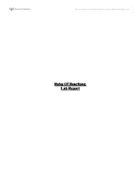Formula of Magnesium Oxide
Chemistry Practical Assessment: Finding the formula of Magnesium Oxide (Skill 3) Results: Table showing measurements before experiment: Mass of crucible (g) Mass of lid (g) Mass of magnesium (g) Mass of crucible and magnesium (g) st try 4.21 1.91 0.9 5.11 2nd try 4.23 1.91 0.9 5.13 3rd try 4.21 1.92 0.8 5.11 Average 4.21 1.91 0.9 5.11 Table showing measurements after experiment: Mass of crucible (g) Mass of lid (g) Mass of contents (g) Mass of crucible and contents (g) st try 4.21 1.91 0.07 5.18 2nd try 4.23 1.91 0.06 5.19 3rd try 4.21 1.92 0.05 5.16 Average 4.21 1.91 0.06 5.18 Mass of products and reactants: ? mass of crucible: 14.21g ? mass of crucible and magnesium before heating: 15.11g ? mass of crucible and magnesium after heating: 15.18g ? mass of magnesium before heating: 0.90g ? mass of magnesium oxide: 0.97g ? mass of oxygen: 0.07g Changes occurring during the reaction: • Magnesium stripe glowed and burned bright orange • Sparks appeared on the surface of the magnesium stripe • Started to shrink and change into white powder form but still glowing This shows that magnesium has reacted with oxygen to form magnesium oxide, a white powder. Appearance of contents at the end of experiment: • White powder • Not in a shape of a coil Number of moles of magnesium and oxygen in magnesium oxide:
displacement reactions of metal
Lab Report on Displacement Reactions of Metals * Hypothesis I can predict that a more reactive metal will displace a less reactive metal from its salts. To predict the displacement, I have applied the knowledge of reactivity and this is my prediction: Copper Magnesium Iron Zinc Magnesium Iron Zinc Copper Magnesium will displace zinc, iron and copper as it is a very reactive metal. Zinc will displace iron and copper but not magnesium as magnesium is more reactive. Iron will displace copper only as it is a less reactive metal. And copper will not be able to displace any metals because it is a very weak metal. * Method 1. I had placed the three pieces of the four different metals on a tile containing twelve holes. 2. Then I added the aqueous solution that is magnesium solution, iron solution, zinc solution & copper solution onto the different metals. 3. Then the reaction took place and I noted the results and the observations. * Results & Observations Metals + Aqueous solutions Results . Copper + Magnesium sulphate No reactions 2. Copper + Iron sulphate No reactions 3. Copper + Zinc sulphate No reactions . Magnesium + Iron sulphate Bubbles were formed, it had
Rate of Reaction Lab
Rates Of Reactions: Lab Report Introduction: In chemistry recently we have been doing the topic of Reactions. In this topic we have been learning about why elements react, how they react and what affects the reaction. For instance, temperature affects the speed of a reaction, and sometimes if there is any reaction at all. Aim: The aim of my experiment is to see how the factor of surface area affects the speed (rate) of a reaction between Hydrochloric Acid and Calcium Carbonate. Hypothesis: I know that the greater the surface area, the faster the reaction. Hence I predict that when I react Hydrochloric Acid with Calcium Carbonate, the Calcium Carbonate marbles will react slower than the Calcium Carbonate powder, as I think the powder has a higher surface area. The variables are as follows: Independent Variable: I shall be changing the surface area of the Calcium Carbonate to prove or disprove that it actually makes a difference to the rate of reaction. Dependant Variable: The Carbon Dioxide given off will be my dependant variable in this experiment. Control: I shall try to control the amount of Calcium Carbonate and acid in each experiment, so it is as close to being the same as possible. Apparatus: -Beaker -Measuring Cylinder -Calcium Carbonate -Scales -Hydrochloric Acid (0.4M) -Pipette Diagram: Method: The apparatus was gathered and set up.










![The Effect of Concentration on the Rate of Reaction between Magnesium [Mg] and Hydrochloric acid [Hcl]](https://mbt-essays-prod-public.s3.eu-west-1.amazonaws.com/934664/listing/934664_1.jpg)










